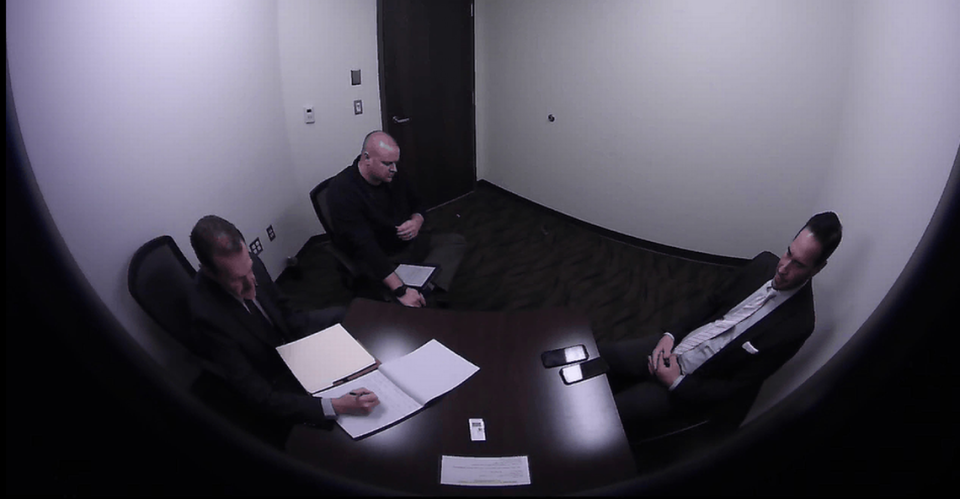Caught in a crossfire. Franklin investigation reveals employee toll of political fights
In recent years, Franklin County has seen an exodus of employees, many of them citing toxicity and bullying by elected officials as their reason for quitting.
New recordings of investigative interviews with employees offer a previously unseen look into how the constant infighting has impacted the ability to do their jobs.
The new audio and video recordings of interviews with county employees and elected officials were obtained by the Tri-City Herald through Washington’s Public Records Act.
The interviews are part of a criminal investigation into allegations against several Franklin County elected leaders suspected of official misconduct, witness tampering, criminal conspiracy and making false statements to law enforcement officials.
The elected officials under investigation are Commissioners Rocky Mullen and Clint Didier, as well as Auditor Matt Beaton.
Among the high-profile departures was a former Human Resources director who described trying to navigate courthouse politics as being akin to the movie “The War of the Roses,” the 1989 film about an acrimonious divorce of an increasingly antagonistic couple.
Employees talked of being caught in the crossfire of political in-fighting among their bosses.
Their comments paint a picture of employees being forced to navigate a courthouse plagued by political grudges and interference of daily tasks by elected officials.
The drama has left employees feeling they need to cover their backs and hold off on following one official’s directive in case another elected official decides to get involved.
Ongoing investigation
A special prosecutor in Everett, Wash., is helping sheriff’s investigators to sort through some of the claims to determine if any laws were broken.
In addition to the criminal investigation, Didier also was served with a cease-and-desist letter after allegedly attempting to have the lead investigator’s wife fired from her job in the Office of Public Defense.
Mullen and Commissioner Steve Bauman were both interviewed by investigators. Mullen and Beaton are accused of coordinating a meeting to allegedly cover up an attempt to manipulate a payment to Simmons Venue Management for work involving the HAPO Center.
In a secret recording by the county administrator, Beaton repeatedly claims Didier told him to interfere.

Bauman is not under investigation, he was just asked to provide investigators with information he might have about that meeting, said investigators during the recorded interviews.
Bauman, who had only been in his position for a few weeks when this all began, expressed concern to investigators over whether the truth would get lost behind all the politics involved.
Didier and Beaton have so far declined to be interviewed by Franklin County sheriff’s investigators, who have involved the assistance of Benton County sheriff’s detectives.

Caught in the middle
The employees interviewed as part of the criminal probe all have regular interactions with the three county commissioners and attended a Jan. 8 meeting about the refused payment to SVM, as well as later discussions.
They are the county administrative assistant Jennifer Medelez, Board of Equalization Clerk Maria Perez and Project Analyst Shirley Jones, who was assigned to work closely with the HAPO Center and SVM.
They said it is common for Didier or Mullen to make a decision, then change it once Beaton gets involved.
The interviews also revealed that elected officials were making decisions about holding payments without explaining why to employees, or reversing their decisions later after the county auditor spoke to another commissioner.
While it may not rise to the level of an illegal “serial meeting,” the interviews show that two commissioners appeared to be making decisions outside of public meetings and giving directions using intermediaries.

Jan. 8 meeting
County Administrator Mike Gonzalez told investigators he thinks the issues probably started when he was trying to mediate a problem between the sheriff’s office and the auditor over meal reimbursement payments.
The issue was escalating and Sheriff Raymond indicated in December 2023 that he might sue the county.
The sheriff claimed Beaton was using employees to launch unwarranted audits to harass elected officials, like himself, and Beaton claimed the sheriff was being abusive toward auditor employees who were trying to do their jobs.

Then on Jan. 8, Didier invited Beaton to join them during a department meeting to back him up on not paying SVM for transition services at the HAPO Center, but the conversation also turned to Beaton’s dispute with the sheriff.
Gonzalez said Beaton allegedly snapped at him at that meeting to “stop taking sides with the sheriff.”
Medelez’s recollection of the conversation was similar. She said Beaton was “getting after Mike about other things, telling him you need to say this and do this. Basically wanting him to do his dirty work.”
The employees said the conversation about SVM also was heated, with Beaton turning his chair to face Gonzalez and raising his voice, though not yelling. Beaton allegedly claimed SVM may have still owed the county money.
In a Jan. 22 meeting secretly recorded by the county administrator, Beaton said unspecified audits would show SVM had mishandled their books. It’s unclear who was performing the audits or who ordered them. There was also a discussion about a $20,000 payment from SVM to the county that the elected officials were allegedly not allowing employees to deposit that payment.
“(Beaton) was basically just being very assertive, telling Mike he needs to call out SVM on their shortage,” Medelez said of the Jan. 8 meeting. “That he needs to basically call … (Steve Simmons), you need to tell them we’re not paying them because we’re shorted. You need to do your job and say we’re not paying it.”
They said the room went quiet during the exchange and the employees shared a look of surprise over what had happened.

At that point the payment already had been sent on for processing, but was rejected because it had the wrong fiscal year listed. Gonzalez contacted the auditor’s office after the meeting to ensure it didn’t get resubmitted.
Both Perez and Medelez told investigators that after the meeting the county treasurer, who was not there, came down to the commissioners office with documents Beaton claimed justified denying the payment. It’s unclear who asked her to do that, but the employees believed it was Beaton.
Creating confusion
Perez said these back-and-forths between elected officials have not only made her job more difficult, but also, creates confusion for vendors and county partners.
“In situations like this when other people influence a decision and decisions are made or changed, it’s kind of hard retracting things you’ve already done,” she said. “I act on it because it was a ‘yes,’ then down the road it’s a ‘no.’ It’s obvious (what happened). It is difficult. It’s difficult.”
She said having to anticipate whether elected officials will involve themselves in day-to-day operations makes her feel like her work ethic is being called into question over situations out of her control.
“It’s constantly waiting and I’ve become accustomed to if I hear a ‘yes,’ I wait a couple days,” she said. “If I get a ‘yes,’ I’ll wait and, sure enough, most of the time it changes.”
In this situation, Jones said she initially told Perez to make sure it was clear who was approving the check, having Gonzalez sign it and add his title in case of retaliation.
Jones said she felt something odd was going on when an auditor’s office employee contacted her about the check. She said she told them that they needed to go through the proper channels.
“I really don’t know how it came about that he became aware,” she said.
Political fallout
Gonzalez told investigators that the issue with the payment felt like he was being forced into the middle of the political infighting, being told to pick a side. He said he felt like decisions were already being made to punish him.
“This is going to be the beginning,” he told investigators. “If Matt is willing to do this kind of stuff to me, I can only imagine the knives that he’s going to put in my back.”
“I’m a pawn in whatever game they want to play,” he said later in the conversation.

Gonzalez described to investigators ways that Beaton was allegedly looking into how his office was being run in order to find ways to make him look bad, and how the employees were being caught in the crossfire.
“He clearly was doing things to subvert my office and to make me look a certain way,” he said.
In one situation Gonzalez described how Medelez was working 10 to 15 hours of overtime to keep the short-staffed office functioning, while another employee was out on maternity leave.
He said Beaton began to interfere when he asked for permission for what he felt was a well deserved raise for Medelez. This led to a situation where the raise request was publicly discussed and denied at an open commission meeting.
“You couldn’t have more turmoil and she held it together,” he said. “Then he did it again, this is right around the same time (as the payment issue), just two or three days before.”
He said the second time Beaton began lobbying commissioners to get involved to put a stop to the clerk getting overtime, despite the fact she was filling in for others.
High-profile resignations
When Gonzalez stepped into his role in March 2023, he attempted to navigate an ongoing dispute between elected officials over how the county’s civil service commission was being run.
The sheriff felt that Michelle Andres, the chair of that committee, was obstructing the hiring process, and the other members would later quit because they could not work with her, according to their resignation letters.
Public records obtained by the Herald showed that the civil service commission meetings were consistently derailed by attempts to rewrite by-laws and candidate lists weren’t being sent forward.
The other civil service commission members agreed to come back after Andres stepped down. But the frustration was spilling over for months and a Human Resources employee responsible for administering the civil service tests to sheriff and jail staff candidates was caught in the middle.
After Gonzalez was hired by the commission, he was able to get commissioners to agree to move that responsibility to his office, but then-HR Director Sam Hughes already had reached a breaking point.
She took elected leaders to task for their behavior during public comments at a commission meeting in February 2023.

“I had one of the worst days professionally yesterday, which made me really examine whether I want to continue to work here or not,” she said at the time.
“Rather than going to work and having positive experiences, which is normal to me, I feel like I’ve stepped into a scene from (the film) War of the Roses. I am not 100% dead here, but I plan to meet with some of you to see what we can do to stop the exodus of personnel and the carnage that disrupts this organization on a continual basis.”
Two months later she resigned, explaining that while Gonzalez was working to help foster a better working environment, many of the elected officials were not.
She was the third HR director to leave in a span of 18 months. In her resignation she said the behavior had led to several department heads and 45 staff leaving in a period of just 13 months.
Then, at the end of last year, County Commissioner Brad Peck also resigned, citing his disgust with the ongoing “bullying” and “cronyism” at the courthouse.
It’s unclear how many more employees have left in the year since Hughes’ comments, but commissioners have since approved a retention incentive last year to pay $5,000 to employees who agreed to stay for at least a year.
The resignation letter of Hughes’ predecessors Eric Wyant and Carlee Nave cited behavior that is shockingly similar to what was described in the criminal investigation interviews by current employees.
Wyant wrote that elected officials who had sway with “the majority of the commissioners” were driving the mistreatment of employees in his office. Nave had made similar statements as she left the county after seven years.
“I would like it to be clearly stated for the record that I am not leaving for the money,” Nave wrote in her resignation. “I am leaving because of the way I, and other employees of the county, (are) treated by many elected officials and their allies.”
She said those unnamed elected officials were “not afraid to throw their staff under the bus because they do not have the courage to lead.”


